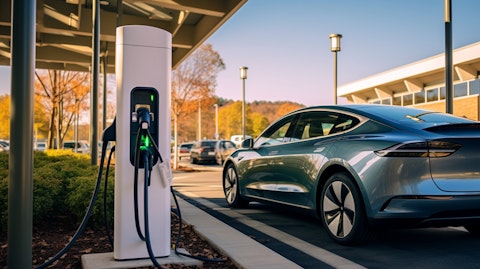We recently published a list of 11 Best EV Charging Stocks To Invest In. In this article, we are going to take a look at where Rivian Automotive, Inc. (NASDAQ:RIVN) stands against other best EV charging stocks.
Over the last few years, the electric vehicle (EV) market has experienced significant growth, due to consumer demand, automaker investments, and substantial government support. In the US, the $7.5 billion from the 2021 Infrastructure Investment and Jobs Act and tax credits from the Inflation Reduction Act have also fueled EV growth.
According to the International Energy Agency (IEA), global public charging points are expected to exceed 15 million by 2030 and will increase to nearly 25 million by 2035. In the U.S., the government aims to install 500,000 public charging ports by 2030, with the total number of chargers expected to reach 900,000 in 2030 and 1.7 million by 2035.
Globally, home charging is expected to grow to over 270 million units by 2035, with more than 45% of electricity coming from public or private non-home chargers. Charging infrastructure for heavy-duty vehicles (HDVs) is also expected to grow significantly. By 2035, installed HDV charging capacity is projected to reach 2,000 GW. Policies like the EU’s Alternative Fuels Infrastructure Regulation and U.S. strategies are driving this expansion, alongside private investments.
The Road Ahead for EV Charging: Industry Growth and Challenges
According to PwC’s analysis, the number of charge points in the U.S. must grow from around 4 million today to 35 million by 2030 to meet demand. The PwC report has projected that the number of EVs could reach 27 million by 2030 and 92 million by 2040.
The EV supply equipment (EVSE) market is expected to expand from $7 billion to $100 billion by 2040, at a 15% compound annual growth rate. The market’s primary value pools are hardware, software, installation services, and charge point operators (CPOs). CPOs, which build, operate, and maintain charging stations, are expected to dominate and capture 65% of market revenue by 2040. On the other hand, hardware providers’ share will shrink from 46% today to 20% by 2040.
Despite the clear market opportunities, challenges remain, including educating consumers, financing infrastructure, and ensuring cost-effective solutions across different charging segments. Companies looking to enter or expand in the EVSE market will need to understand evolving customer needs, adopt appropriate business models, and prepare for long-term investments with a focus on strategic partnerships and potential acquisitions.
Why are we interested in the stocks that hedge funds pile into? The reason is simple: our research has shown that we can outperform the market by imitating the top stock picks of the best hedge funds. Our quarterly newsletter’s strategy selects 14 small-cap and large-cap stocks every quarter and has returned 275% since May 2014, beating its benchmark by 150 percentage points (see more details here).

A state-of-the-art electric vehicle charging at a station at a suburban mall.
Rivian Automotive (NASDAQ:RIVN)
Number of Hedge Fund Holders: 37
One of the best EV charging stocks, Rivian Automotive (NASDAQ:RIVN) is a well-known name in the EV industry. It is making considerable advancements with its charging infrastructure to support the increasing number of EVs on the road.
At the core of the company’s strategy is the Rivian Adventure Network (RAN), which is a dedicated network of DC fast chargers exclusively for Rivian owners. As of February, the network featured 400 fast chargers distributed across 67 locations in the U.S. The company plans to expand this network significantly, aiming to install 3,500 chargers across about 600 sites in the U.S. and Canada by the end of 2025.
The company’s commitment to improving its charging infrastructure is further evident from its recent decision to open the RAN to other electric vehicle brands by the end of 2024. It will allow vehicles equipped with CCS (Combined Charging System) ports to use the company’s chargers, which will broaden the network’s accessibility and benefit the entire EV community.
Additionally, it has introduced a new charger design that accommodates both 400-volt and 800-volt battery systems, which ensures compatibility with a wide range of EVs.
Alongside the RAN, Rivian (NASDAQ:RIVN) offers Level 2 charging solutions through its Rivian Waypoints. The public chargers are situated near popular spots like shopping centers, restaurants, hotels, and parks, which allows EV owners to recharge their vehicles conveniently while they are out. The company intends to deploy over 10,000 Waypoint chargers throughout the U.S. and Canada to increase the ease of charging for all EV drivers.
For home use, the company provides the Wall Charger, which delivers 11.5 kW of power for efficient overnight charging. The home charger is compatible with most EVs and comes with Wi-Fi connectivity for over-the-air updates. Additionally, the company includes a portable charger with each vehicle, which lets users charge their cars using both 240V and 120V outlets.
Rivian’s (NASDAQ:RIVN) charging infrastructure is powered entirely by renewable energy, which aligns with the company’s dedication to environmental sustainability. The RAN has achieved an uptime of over 98% in 2024, reflecting the reliability and strength of the company’s charging network.
It plans to adopt the North American Charging Standard (NACS) beginning in 2025. The transition will allow Rivian vehicles to use Tesla’s expansive Supercharger network through a NACS DC adapter. During the transition, Rivian’s chargers will also support NACS adapters, which facilitates continued compatibility and ease of use for Rivian owners.
Supported by various national and state initiatives, such as the U.S. National Electric Vehicle Infrastructure (NEVI) program, the company is well-positioned to leverage these incentives to expand its charging network and drive the adoption of electric vehicles. Its Q2 performance reflects its growth potential, with deliveries increasing by 9% year over year to 13,790 units and generating around $1.2 billion in revenue.
In Q2, 37 hedge funds held stakes in Rivian (NASDAQ:RIVN), with positions worth $383.602 million. As of the second quarter, SoMa Equity Partners is the most significant shareholder in the company. The firm has increased its stake in the company by 53% to 6.6 million shares worth $88.5 million.
Meridian Hedged Equity Fund stated the following regarding Rivian Automotive, Inc. (NASDAQ:RIVN) in its first quarter 2024 investor letter:
“Rivian Automotive, Inc. (NASDAQ:RIVN) is a US-based manufacturer of electric vehicles, namely the R1T pickup truck and R1S SUV. They also have exposure to the commercial vehicle market with their electric delivery vans (EDVs) that are sold to companies like Amazon. The company has faced challenges amid the broader slowdown in electric vehicle demand and rising interest rates. This has contributed to Rivian underperforming expectations over the past few quarters. Rivian has also incurred losses as it continues to invest in the development of its products and manufacturing capabilities. We own Rivian in a hedged structure, which provides a significant margin of safety. Despite the near[1]term challenges, several factors provide optimism that Rivian can emerge as a long-term winner in the EV market. Rivian’s balance sheet is strong, with a substantial cash position that enables the company to continue investing in its growth and navigate through the current economic headwinds. Rivian is also unveiling the R2, which is a smaller and more affordable EV platform that will open the company’s products to a wider customer base. Lastly, Rivian’s investment in the enhancement of its production capabilities should improve the company’s manufacturing efficiency and drive a path to profitability. We continue to hold the company in a hedged structure.”
Overall RIVN ranks 3rd on our list of the best EV charging stocks. While we acknowledge the potential of RIVN as an investment, our conviction lies in the belief that AI stocks hold greater promise for delivering higher returns and doing so within a shorter timeframe. If you are looking for an AI stock that is more promising than RIVN but that trades at less than 5 times its earnings, check out our report about the cheapest AI stock.
Read Next: $30 Trillion Opportunity: 15 Best Humanoid Robot Stocks to Buy According to Morgan Stanley and Jim Cramer Says NVIDIA ‘Has Become A Wasteland’.
Disclosure. None. This article is originally published at Insider Monkey.





